#Hypofrontality
Text
had another cardiologist appointment this past monday (actual cardiologist this time not np/pa) went as follows:
acknowledged that the meds are helping me a lot
said "no, nausea's not part of POTS. you have to talk to your primary care physician about that because that could be something else". 1, it is a symptom of POTS, and 2, it's listed as a symptom of POTS on the information YOUR OFFICE SENT ME
he acknowledged the meds are helping me and wants me off them in 6 months, or at least decreased
he said that there was a mayoclinic study where the majority of POTS patients grew out of that. 1, that was pediatric diagnosed POTS, 2 they had been treated for 5 prior to the data collection, and 3 only 18.2% actually "grew out of it" and fully recovered. 50-ish% percent did have better health/fewer symptoms but they still had pots. and that still leaves about 30% unaccounted for who either dropped out of the study, stayed the same, or got worse
said he tries to lower meds for his other POTS patients and it usually doesn't work. i can't even say i asked him that he just straight up volunteered it
i had an ecg at this appointment :) he came in to talk to me after and had it pulled up on his screen :)) days later it's available on the website and gives the time of him interpreting and signing it as after my appointment time. admittedly i would not give a shit about this but i was normal sinus rhythm on other ecg's in the past and now have "incomplete right bundle branch block". this was not mentioned to ME. we even had to call the office after to get my meds refilled because forgot to at the appointment and it wasn't mentioned. the FUCK does that mean for me???? internet says either not dangerous or sign of dangerous "depending on signs of presyncope and chest pain" which i already get with my POTS
listened to my heart over my sweater even though i had a tank top on underneath and said as much. the FUCK do you plan to hear that way, jackshit??
#i am terrified of my meds being lowered#it seems like my depression was from lack of bloodflow to my brain#from my low blood pressure with it (60s/40s) which i looked up and while there aren't direct studies with POTS decreased blood flow#to the prefrontal cortex (hypofrontality) can cause symptoms of depression#schizophrenia adhd bpd anxiety etc#and i was literally suicidal for months until i took the meds. within literally an hour of my first dose i was feeling better#you can't die directly from POTS but i'm terrified of going off meds and hurting myself#or failing out of school again#also fun lil statistic 25% of POTS patients are too disabled to work or go to school#i was part of that 25% in NURSING SCHOOL and it SUCKED
2 notes
·
View notes
Text
Stop Porn Addiction with this||Recover from Porn Addiction with this video
youtube
You saw a lot of videos & blogs on how to stop porn addiction. You tried several times to defeat this addiction but you failed every time.you fall back into old habits of porn, mastarbation. But I assure you that this will be the last video you are watching on this topic.
The process of defeating porn addiction is multistep and long. Addiction takes a substantial amount of time to form in your brain. So the process of recovering from porn addiction will take a good amount of time. Please take a pen and a sheet of paper with you before you start watching this video as I will give you different situations and questions to answer. You must do that while watching this video to stop this bad addiction. Please write those answers honestly. So let’s start
The hardest part of recovering from pornography is the first few months. most people failed in this stage.But you can win. Watch my previous video on how porn affects mind then you understand certain terms so watch the previous video to understand how your brain get affected by the pornography. First few months is hardest and most challenging because of desensitization, Hypofrontality, and the altered stress system. so as mentioned before this processes are a result of reduction in receptor sites of neurons in brain. Recovering from this phase requires you to reduce the stimulation received from pornograpgy and other high producing sources of dopamine stimulation. This process usually last between 2-7 months. It can be more or less for different individuals.
During the first few months, it’s extremely hard and challenging to abstain from pornography. In this case ” SIMPLE WILLPOWER IS NOT ENOUGH “. If you relapse during this stage don’t get discouraged. This doesn’t imply that you are weak or lack the necessary mental strength to stick with a plan. The strongest and best of us would be in the same situation you are in currently. You need all of your receptor sites to fight off those evil urges. When those receptor sites are back you will have the choice to choose those old things that used to bring you pleasure and satisfaction. Untill that happens you need take steps to safeguard yourself to fight off hypofrontality and the altered stress system.
Exercise regularly
This is the best advice I can give you. Exercise regularly for at least 1hour. The main point behind this is to get those happy hormones and make your body exhausted to such an extent that you don’t feel any urges. Exercise in evening after college ends. You can mix strength training along with aerobic training. Exercise your arms legs shoulder abs. You will be out of energy because of this intense exercises. So you won’t feel that urge to see porn. You must exercise everyday. Don’t stop yourself for at least one day. This is critical time for you.
Remove all access to pornography
You have invested years into this addiction so your hypofrontality severely limits your ability to stay away from porn addiction. Removing all access to porn is a right and quite important step towards defeating those evil urges. Your brain will tell you to keep this choice open because it is a hard step.
Some of you may need help from family, friends, and healthcare professionals. If You are thinking about professional help then go for it. Their help is valuable.
So you have to think strategically keeping in mind that this addiction is your enemy.
Think of your triggers. Is it all those porn videos on your device, those pictures of models you see on Pinterest, overconsumption of internet that brings those evil urges? Is it all photos on your device? Is it because of time you spend on your bed? Is it because of those hot webseries? Is it because of TV?
Write down those triggers on a sheet of paper you took before. Now what you can do?
Install pornnographic blocking software and apps. You will find nofap apps that can help you.
Delete all those porn videos, and photos of porn actresses and models on your device.
Limit your internet usage. Recharge your phone with the minimum package necessary keeping in mind that you will only use the device constructively.
Uninstall all .apk file of porn hub and other porn websites.
Donate your premium membership of all porn websites and apps
Make a rule to your mind “Bed is only for sleeping”
Limit interaction with TV or any friends that share porn videos with you.
Your children may be at risk of exposing themselves to pornography so install apps and software that monitor the internet’s use and record each keystroke and website they have visited. A simple Google search is sufficient for that.
Mental toughness
It may seem like a tough and drastic step but in 3-6 months you will regain your control then you can start increasing the usage of your internet. Remember if you are trying the steps I just mention for the first time then you will fail a few times. But don’t give up. Remember next is a new day. Start with renewed eagerness and hope. Don’t lie in bed and don’t try to be alone in your room.
You will relapse if you are alone and bored. So avoid that. No matter how hard you try, sometimes old images and memories will flood your mind because Your body attempts to obtain dopamine associated with pornographic use. The more social you become the more successful you become at this. Ask yourself “What do I want to become in life? ” Then start working towards it to make yourself busy.
Stress inoculation techniques
This technique is a form of cognitive behavioral therapy techniques. I am giving this technique as a form to educate us. So the inoculation techniques help you manage deep muscle relaxation, cognitive restructuring, breathing exercises. First you have to identify personal risk factors that may be biological (lack of sleep, sickness, poor nutrition, low dopamine) psychological ( denial, rumination) social ( relationship problems) . Once you identify risk factors they will be mitigated.
Ask yourself the following questions and write answers of questions
What are the factors that can increase your stress?
Answer-
What are the ways to minimize stress?
Answer-
What can prevent or reduce your risk of experiencing stress?
Answer
What can you do to maximize time of reduction of stress?
Answer
When you are under stress your breathing pattern changes. An anxious person takes small shallow breaths using their shoulder rather than a diaphragm to move air in and out of the lungs. You may feel
Chest tightness
Constant fatigue
Faintness and light headedness
Feeling of panic headaches
Heart palpitations and insomnia
Muscular aches and tingling numbness cold hand and face
So different breathing techniques will help you to control anxiety and stress response. First breathing technique – shift from upper chest breathing to abdominal breathing. Sit comfortably in a relaxed state. Raise your rib cage placing one hand on the chest and rib cage. Take notice of how your upper chest and abdomen are moving while breathing. Concentrate on your breath noticing how to breathe through your nose and out through your mouth. Do it 3 times a day for at least 2 months.
The next technique helps you to relax your muscles and mind. Tense each muscle group vigorously but without straining suddenly release the tension and feel the muscle group relax. You’ll be able to realize when it is tense and able to release tension. Tighten the muscle in the biceps, feel that build-up of tension, hold it for 5 seconds enjoy that feeling of limpness. Breathe in and out. Pause for 10 seconds. Apply the same method for the tricep, upper back, shoulder, chest, buttocks, thighs, feet, toes, and eye muscles. You can choose to keep focusing on your breathing for a longer duration of time. Do it 03 times a day for 02 months.
Another technique is distraction.
When you become stressed, your attention tends to narrow focusing on what you find stressful. This is known as tunnel vision. The distraction technique helps you to disconnect from what’s bothering you, refocusing your attention. If you think that if you don’t focus on the problem then it will get worse. Then this distraction method will not going to work for you. Say to yourself that I will be back to my problem after I eliminate the stress. You can use ESCAPES distraction method.
Escapes is an acronym for Emotions, Sensation, Comparisons, Activities, pushing away, Echoing, and Service.
Emotion– if you feel urges, regret, anger hopelessness, or a list of other negative symptoms then focus your mind on something else. See an inspiring video, read the newspaper, tv. Hang out with supportive friends who know nothing about that. The Point is to feel the opposite by diverting your mind.
Sensation- Sit in a warm bath with bath salts that provide calming smells. Have a cold shower to reduce sexual tension, hold onto ice or snap a rubber band on their wrist.
Comparison- many people become extremely stressed when they compare themselves with others. Correct way to comparison is the key. Try to compare yourself with your past-self. Know that you want to stop porn addiction which will lead to better health. So you are becoming better version of yourself.
Activities- engaging in activities that require attention and focus is an effective method of distracting our minds from distressing thoughts. Engage with strategy games like chess , organizing things is good way to distract yourself.
Pushing away- mentally leave a distressing situation once is quite good way to distraction. Picture yourself in mountains looking at clouds. The goal is to focus an internal relaxing stimuli to push yourself away from an internal stimuli.
Echoing- replay a song, recite a poem, count the number of stairs to calm yourself.
Service– helping someone is great way to get out of own problems.
Key to defeating pornography cycle is to identify the event and triggers that leads to relapse & prolonged addiction. Understand and list down your triggers, cravings, lapses, and the guilt that follows.
List down all triggers. Write it down.
How can i manage it?Answer it
Mindfulness
Observe your surroundings, any books, fruits, and other things that are present to such an extent that you can describe each detail with full perfection. It’s an effective way to distract yourself from those evil urges.
Thanks for reading
#pornaddiction#anti pornography#recoverfromporn#howtostoppornaddiction#better yourself#betterlife#lifestyle#life lessons#productivityboost#youtube
0 notes
Text
Research
Lower blood pressure
Stronger immune system
Better heart health
Improved self-esteem
Decreased symptoms of depression and anxiety
Better sleep routines
These are some of the physical health benefits that the article shows that are linked to having sex, they are also the same for meditation.
One study suggests that being dominant in the bedroom can boost your work ethic. Other research in this area has suggested engaging in BDSM activities can boost your mental well-being and increase awareness of your attachment style in partnerships, which can ultimately lead to healthier relationships. The more research that is conducted the more undeniably the benefits of BDSM and shibari are to being a well adjusted member of society and a happier individual.
There is a proven connection between BDSM interactions and altered states of consciousness.
According to a 2016 study, there is a direct link between BDSM interactions and ASCs (altered states of consciousness) – the significant one, in this case, being that engaging in a submissive role during BDSM play can lead to transient hypofrontality.
This article goes on to further explain 'Transient hypofrontality', a term coined by Dr. Arne Dietrich, is when the focused, thought-processing part of the brain is “shut off” by external triggers. An example of this is the difference between engaging in a competitive sport and running in a beautiful park. During a competitive sport, your brain will need to make a variety of complex decisions. While you’re running a calmer path in a beautiful park, however, your mind can “let go” of that prefrontal engagement and you can experience an alternate (relaxed) state of consciousness. For a submissive, during BDSM scenes, this can result in reduced self-reported stress and increased sexual arousal.
0 notes
Text
Neuroscience Blog: Addressing the Stigma Surrounding Schizophrenia
A significant stigma surrounds the discussion of schizophrenia as a neurodevelopmental disorder. This stigma existed not only in the medical community for many years but similarly bled over into the public sphere. Much of the stigma affecting patients with schizophrenia is interpersonal, even among those who have consciously distanced themselves from stereotyping the illness or using pejoratives to reference those living with schizophrenia. These stigmata have wide-reaching effects on patients with schizophrenia and can influence their overall employment, carceral status, health care, and housing. This exploration's primary aim is to speak frankly about the nature of schizophrenia—from a research perspective—and marry that research focus with an open and accessible written format.
As a brief introduction, schizophrenia is classified as a syndrome that is commonly identified by neurodevelopmental abnormalities in the temporal lobe, several limbic regions—chief among these the amygdala and the hippocampus— and the basal ganglia. These abnormalities in the brain can also affect the overall symmetry of the hemispheres of the brain. These regions of the brain typically have reduced volume. This volume decrease is not neurodegenerative—like Parkinson’s for example—and is instead neurodevelopmental. Other common negative symptoms of schizophrenia include neural degeneration in the hippocampus and hypofrontality. Hypofrontality is a state of decreased cerebral blood flow (CBF) to the prefrontal cortex of the brain and neural disorganization in the hippocampus refers to the way pathways grow in the region. In neurotypical selections, neurons in the hippocampus are expressed in relatively regimented and uniform columns. In a disorganized selection, the neurons present in a more sporadic or radial way.
It is important to acknowledge the historical approach taken by the medical community to schizophrenia over the last century of rendered care. During the late 19th century schizophrenia was discovered and originally characterized as early-onset dementia. This history is enshrined in schizophrenia’s first name “dementia praecox” coined by Dr. Emile Kraepelin in 1887. Schizophrenia was characterized as the fundamental disorder of the four psychological A’s → disturbance of associations, affect, ambivalence, and autistic isolation.”
This remained the dominant understanding of schizophrenia until the advent of neuroleptics (a.k.a. first-generation antipsychotics). It is with this discovery that schizophrenia was correctly identified as a dopamine-linked disorder. First-generation antipsychotics—e.g. Haloperidol—successfully reduced the antipsychotic symptoms in patients with schizophrenia. They did this by acting as permanent antagonist to dopamine receptors in the brain. Their target system was the mesolimbic pathway, as it was this pathway that suffered from the over-activation of dopamine receptors (which triggers psychosis). Unfortunately, these first-generation drugs were not very specific on which dopamine receptors they antagonized, so there were severe side-effects. Patients with schizophrenia commonly suffer from dopaminergic deficiencies in the mesocortical pathway at the same time that they suffer from the overexpression of dopaminergic responses in the mesolimbic pathway. The mesocortical pathway—in systems treated with drugs like Haloperidol—also recieves the antagonism to dopamine receptors. This functionally worsens the negative symptoms they were suffering from at rest. Another side-effect from first-generation drugs was a selection of motor abnormalities (movement based) due to the antagonism of dopamine receptors in the nigrostriatal pathway. Newer drugs have successfully bypassed many of these negative side-effects while still operating successfully as antipsychotics.
To conclude, I want to touch on the outward symptoms of someone living with schizophrenia and how it can potentially manifest when unmedicated. Common symptoms include: auditory hallucinations, delusions of grandeur/mania, heightened anxiety and paranoia, etc. Each of these symptoms can vary with severity and can be expressed/not in individual cases. There are several common misconceptions about these symptoms that add the the stigmatization of a schizophrenia diagnosis.
Auditory hallucinations: These hallucinations are generally described as familiar voices to the patient with schizophrenia. They can come in multiples or present with primarily one dominant voice. They’ve been reported to make demands and to say uniquely unkind and cruel things about both the patient and the people around the patient. In the event of a demand being denied/failed to be completed, the voices have been reported to grow louder, more insistent. Some people mischaracterize these voices as a collected expression of “intrusive thoughts.” This is untrue on several accounts, the primary one being that intrusive thoughts are commonly conceptualized as an internal voice, whereas auditory hallucinations in patients with schizophrenia are commonly reported to localize outside of the patients head, as if someone is speaking in their ear.
Delusions of grandeur/mania: Patients have reported to feel a sense of fame akin to celebrities. While, in hindsight, they are able to view themselves with a sense of realism in the moment it is near impossible to rationalize these feelings of delusion.
Paranoia: Similar to the delusion of grandeur, this paranoia is reported as a mounting fear of an unknown “them” coming to hunt and capture the patient with schizophrenia. For further reading → Rethinking schizophrenia | Nature
0 notes
Text
transient hypofrontality : why walking / movement / exercise can improve thinking + mental health?
basically means temporarily toning down the activity in certain parts of the brain. In particular, the frontal lobes, which are involved in higher processes such as memory, judgement and language.
By turning it down a notch, the brain adopts a totally different style of thinking – one which may lead to insights you wouldn’t get at your desk. (1)
Like diffuse thinking.
Transient hypofrontality, then, means that for a while, under certain conditions, the focused thinking part of our brain gets a rest. This allows other parts and functions to become more dominant.
You can be deliberate about invoking this state, at least some of the time. Like lucid dreaming, you might set out on a run (or perhaps some other vigorous, repetitive activity such as swimming or cycling) and ask yourself an important question or issue. Then put it aside and just notice if an internal response shows up. Although I suspect that Dietrich would cringe at this explanation, my more mystical self thinks of this as your “silver-lining voice,” the part of you that has the capacity to fully understand your self and “knows” what it is that is most central to your being.
But be forewarned: Indeed, like dreams, transient hypofrontality is indeed transient: unless you shift into active and intentional thinking and remembering, thoughts and ideas that come to you are likely to float away. If you want to recall any of this at a later time, turn it into words, ... (2)
1. https://www.bbc.com/future/article/20170612-what-you-can-learn-from-einsteins-quirky-habits
2. https://www.psychologytoday.com/us/blog/the-edge-peak-performance-psychology/201703/the-transient-hypofrontality-edge
1 note
·
View note
Text
“Ultimately, abundance is about creating a world of possibility: a world where everyone’s days are spent dreaming and doing, not scrapping and scraping.”
Abundance by Steven Kotler
1 note
·
View note
Note
Hello! I've loved following your educational rants via mental illnesses/stimulants/medical malpractice (maybe? probably, fuck donny) but you're really good at explaining things in ways my brain can handle, would you mind giving a go at explaining the under/overatimukation parts of adhd in more detail and how it relates to executive dysfunction? I've just always had a hard time grasping it, even when it's the biggest issue in my own life. <3 tysm!
alright i'll give it a bash
your regularly scheduled reminder i am not a medical doctor i am just A Fucking Nerd(tm)
i might fail at explaining this because it involves the physical structure and mechanism of the brain
most of the executive function stuff is handled by your prefrontal cortex.
people with adhd, schizophrenia, bipolar disorder, and major depressive disorder have a specific problem in the prefrontal cortex known as "hypofrontality". it's a decreased state of blood flow to that area.
this decreased blood flow does 2 things
- it increases norepinephrine transmission, which is basically a "stress chemical"
- it decreases dopamine transmission (both in and out)
dopamine is the "stimulation chemical". since you naturally, physically, biologically, have less dopamine being able to travel in and out of that brain area then the executive functions it controls suffer
anything which gives you more dopamine will help executive functioning because then you're throwing extra dopamine at it and some more will get through
essentially the bit of your brain that lets you Do Stuff cannot get enough of the Do Stuff chemical by itself because it is biologically a bit broken so you have to throw more Do Stuff chemical at it artificially until it works
44 notes
·
View notes
Text
The Message Archangel #01
*trigger warning: p0rn0gr4phy.
We should talk more about how damaging p0rn0graphy culture is.

Yesterday at Howard Stern podcast, Billie Eilish said, very loud and clear, that “p0rn0graphy is a disgrace”.
I do agree with her.
At the podcast, she tells that she was exposed to porn at a very young age. “As a woman, I think porn is a disgrace, and I used to watch a lot of porn, to be honest. I started watching porn when I was like 11, I didn’t understand why it was a bad thing. I thought that’s how you learned how to have sex. I was an advocate and I thought I was ‘one of the guys’ and would talk about it and think I was really cool for not having a problem with it and not seeing why it was bad and…I think it really destroyed my brain and I feel incredibly devastated that I was exposed to so much porn”, Eilish says.


Personally, I think it is important people with a huge platform like Billie talk about necessary topics. P*rnography industry is one of this topics.
Despite having many celebrities trying to make porn look cool, normal and even “feel like a piece of art”, porn culture is a problem. And your favorite celebrities can’t deny it.
There are countless articles, scientific researches, reports - not to mention health professionals - that warn about the harmful effects of pornography consumption. Some of the effects are erectile dysfunction, anxiety and depression - coming from dopamine malfunction, addiction, etc.
A interesting point to take a look it is: since the popularization of the recorded voyeurism, in each succeeding generation, the age of exposure tends to be lower. An example is Gen Z, where the average age at which an individual is exposed to voyeurism is 10-12 years old.
Since we landed on pre-teenagers under voyeur exposure, we should look closely on mental health. Pornography consumers report greater depressive symptoms, lower quality of life, and poorer mental health compared to those who do not view pornography.
Another point to look is that, porn consumers tend to look for unconventional scenes. Recent analysis from a provider I won't reveal it’s name, expose that conventional sex is becoming less and less interesting to users and is being replaced by topics such as incest and violence.
Which means that the demand for online sexual violence can increase real-life incident rates.
Going way beyond, we have damage from a moral point of view, since consumption also causes damage to the prefrontal cortex - the region of the brain that houses executive functions such as morality, willpower, and impulse control - according to Rachel Anne Barr, a Neuroscience PhD student from Belgium, damage to the prefrontal cortex in adulthood is named hypofrontality, which predisposes an individual to behave compulsively and make poor decisions.
The damaging also extends to people that work with the pornography industry. According to Pink Cross Foundation, a non-profit founded by former porn actress Shelley Luben, the life expectancy of a porn actress is 36 years, while the U.S. national average is 78 years. The rate of infection with gonorrhea and chlamydia is 10 times higher among porn actors, 70% of actors and actresses are addicted to alcohol or drugs, and approximately 20% of actors have an STD. These diseases are added to terrible working conditions, which in some circumstances involve abuse and violence.
All in all, what promises to bring pleasure, brings only harm. For the people who consume to people who work with.
This leads us to question:
Why we still living under the influence of p0rn0graphy culture in society? And even, letting it pass? Maybe because we’re talking about a billion dollar industry? Or is it our society use the antiqueness of voyeurism to keep in damage?
Too many questions to a problem that seems to have fewer solutions.
Well, that's it for today. I wrote this text in a attempt to raise awareness about something so dangerous and harmful.
-


sources:
Albury, K (2014) Porn and sex education, porn as sex education. Porn Studies 1(1–2): 172–181.
Uliano, André Borges. Pesquisadores publicam monografia sobre “Os Custos Sociais da Pornografia”. Gazeta do Povo. Online Archive.
Barr, R. Anne. (2019) Watching pornography rewires the brain to a more juvenile state. Online Archive <https://theconversation.com/watching-pornography-rewires-the-brain-to-a-more-juvenile-state-127306>
3 notes
·
View notes
Note
Hey Doc. Is it true that having ADHD means having like a different brain like a brain that doesn’t work normal? Asking for reasons.
Hey.
It’s certainly not that the brain isn’t working normal. Normal is a relative term.
Some cases of ADHD are associated with what is called ‘hypofrontality.’ This is lower than average levels of blood flow and activity in the frontal lobes.
The frontal lobes are the part of the brain associated with impulse control, judgement, attention, planning and initiating behavior. Lower levels of activity in this region is connected with deficits in executive functioning. It can be a major etiological factor in some cases of ADHD.
Stimulant medications increase blood flow and activity in the brain; essentially compensating for lower than average frontal lobe activity.
It’s impossible to gage frontal lobe activity without a functional MRI scan (which is quite expensive). The assumption is that, if a stimulant medication works, then it is correcting hypofrontality.
Then again stimulants can have the same effect on those who have normative or even higher then average frontal lobe activity.
So of thus aside, hypofrontality does not constitute aberrant neurology. No two brains work exactly alike. There are plenty of cases of ADHD that do not entail hypofrontality as well as many situations of hypofrontality that do not entail ADHD.
8 notes
·
View notes
Note
I've been wondering for a while, what condition does braindead/brainrot refer to? I've always thought it was similar to "use your brain" and didn't know it's ableist
Being brain-dead refers to a specific state of consciousness (well, a lack of). Your heart is still beating, so your brain can do that much, but unlike sleeping, unconsciousness, or a coma, there's no other neural activity. There's no you anymore, just your body. It's what happened to Carrie Fisher, for example, after spending 15 minutes flatlined. They brought her heart back, but not her mind. The lights are on but nobody's home, so to speak.
Brainrot could refer to a lot of conditions. Neurodegenerative issues are actually pretty common. Alzheimer's and other prion diseases. Hell, even schizophrenia presents with clear physiological brain differences, including enlarged ventricles (implying the mass that would usually fill that space is missing). Depression can cause cortical thinning, people with ADHD have brains that are minutely smaller, hypofrontality is common (though this is lack of use rather than lack of presence), etc.
Just ask the resident neuroscientist pro-shipper, j-at ;P! The brain can look and organise itself many different ways and still make you a conscious, feeling human being.
29 notes
·
View notes
Text
me scrolling thru tumblr aware of the adhd-induced hypofrontality killing my grey matter, and rmring reddit telling me to microdose LSD to fix my noggin’
5 notes
·
View notes
Text
7 Reasons to Spend Mindful Time in Nature

Humans are designed to be outdoors. Your mind is wired to respond to the scents, views, as well as feelings you receive outside. When you invest day-to-day time outside it makes you healthier and happier. Taking notice of your setting in a concentrated as well as mindful method while you are spending time on the coastline or in the woods feels terrific. Right here are 7 science-backed reasons we all require to get outside and play!
1) Stress Decreases in Nature
Cortisol is a hormone typically used as a stress pen by physicians (way too much ways you are as well stressed out). Studies have located that trainees who had invested time in the woodland had a reduced degree of cortisol than their counterparts that remained inside. Workplace workers that have a sight of nature out of their home window or with a skylight record greater job complete satisfaction and lower stress and anxiety degrees, and also hospital individuals that have a sight of nature actually heal quicker. Next time you really feel stressed, locate some relief with "forest therapy."
2) Short-Term Memory Increases
In a research done by University of Michigan, a group of individuals strolled around an arboretum ( believe zoo for trees) and also the other fifty percent strolled down a paved city road. When both groups did a memory examination prior to and after their walks, those who had walked amongst trees did almost 20 percent better than they had actually done before walking. The results of those who walked in the city revealed little to no change.
3) Mental Power Is Refreshed as well as Restored
When you take a 15-minute walk or invest a minute looking at the celebrities from your roof, you reduce as well as really feel a link to something bigger. This sense of connection assists stabilize state of minds and decreases stress and anxiety. Nature recovers, refreshes, as well as invigorates us.
A recent research located that walks in the woodland were specifically associated with lowered degrees of anxiousness. Medically, this can be made use of to supplement existing treatments for significant depressive disorder. One more research study utilized land-use data as well as satellite modern technology to find that access to green room within a half mile of one's house is connected with boosted mental health.
4) Thinking Becomes Clearer and also Focus Improves
We recognize that time in nature is corrective, yet it can likewise boost focus, the effect on interest of nature is so strong that youngsters with ADHD were located to have actually been much more able to concentrate after just 20 mins outside. When university student were asked to repeat series of numbers by memory, they were a lot more accurate at performing this task after they had a 20-minute stroll in nature.
One of the factors for this might be short-term hypofrontality. EEG researches show that creative people show transient hypofrontality when engaged in the service of creative troubles. This indicates that the mind is in fact utilizing different locations to believe with problems when you are outdoors versus inside.
5) Positivity Increases
In an informal research study done by conservationist David Suzuki, individuals reported spending half an hour every day in nature enhanced individual wellness as well as joy. Among Dr. Suzuki's affiliates, physician Eva Selhub, discovered this connection between nature, human health and wellness, and happiness in her publication, Your Mind on Nature: The Science of Nature's Influence on Your Wellness, Joy and Vitality. ( I recommend reading it at the beach or on a park bench.)
6) Barriers Break Down
A record published in Lancet concerning an across the country research in the UK discovered green area is an extensive equalizer of health and wellness inequalities. When low income areas were associated with little accessibility to environment-friendly room, there were substantial wellness disparities between reduced as well as higher socio-economic braces. This void was connected when low-income people had accessibility to eco-friendly room near home and also hung out in it daily. Nature aided to fill out the broad health and wellness divide in between the wealthy and also the at-risk.
7) Enhances Mental Wellness for Urban Dwellers
More than half of people currently live in city areas. By 2050, this proportion will be 70 percent. Urbanization is related to raised levels of mental disorder, however it's not yet clear why. Ruminations or repeated ideas focused on the negative aspects of self were revealed to noticeably reduce by spending 90 minutes in nature.
In today's climate where we often define ourselves by how hectic we are, investing a little time in nature daily goes a lengthy way towards increased vitality as well as it will certainly assist your mind to keep you happier, healthier, and extra productive.
3 notes
·
View notes
Photo

Moon Girl and Devil Dinosaur #34 Review
spoilers spoilers spoilers spoilers spoilers spoilers spoilers spoilers spoilers
Desperation can cause even the most brilliant among us to make mistakes. And Lunella Lafayette has made a critical error in her effort to find a solution to preventing her super-powered mind-swapping with Devil Dinosaur. Things went wrong and it all resulted in Devil D being transformed from a savage tyrannosaurus into a savage nine-year-old boy. Which is worse?
From the creative team of Brandon Montclare, Natacha Bustos and Tamra Bonvillain. Quick recap and review following the jump.
Things have been rather hectic over at the Lower East Side elementary school, PS20. The new mayor, The villainous Wilson ‘The Kingpin’ Fisk, is threatening to shut the school down unless the students perform especially well on a set of standardized tests; the Kingpin’s adopted daughter, Princess, has enrolled and appears dead-set on making sure these tests are not passed; and now there is an especially odd new student with red hair and crazy eyes named Devin, whom Lunella tries to convince the others is a family friend from Canada.

Well, Devin may look like a normal little boy, but he is still very much a dinosaur at heart and he knows bad news when he sees it. Princess approaches and Devin leaps forward to attack her. It takes everything Lunella has to keep Devin at bay and make sure that serious trouble doesn’t ensue.

Of course ‘serious trouble’ is among Lunella’s friend, Eduardo’s most favorite things and he decides to set things off by swatting Princess’ backside with an oversized copy of the Fantastic Four omnibus.
Pandemonium ensues and before you know it, Devin is standing atop the desks roaring king of the jungle style. It’s good stuff… pretty much how I recall primary school being like...

Later, Lunella has an after school meal with her grandparents at Yancy Burger. This apparently is a twice-monthly affair where Lunella gets to send time with both of her sets of grandparents, her mom’s parents and her dad’s parents. Which should be nice although both Lunella’s grandmothers spend a lot of time arguing over which of their two children Lunella most takes after. And they’re all confused as to why Lunella has chosen to bring along this poor-mannered redheaded…

Lunella seems rather intrigued to hear that she so reminds her grandparents of her own parents when they were her age. It’s been so difficult for her to relate to her mom and dad; the idea that they were kind of like her in their youth is quite appealing to her.
Unfortunately, Lunella cannot stick around to discuss the matter further. Devin has gone and snuck off and Lunella has to chase after him, making up some lame excuse as to why she needs to bail out.

Devin has wondered down the street and finds Zoe and Eduardo chatting with Princess. Princess is especially annoyed that Devin has shown up. She’s desperate for attention, they had all been talking about her and now Devin has appeared to steel her spotlight. Not to mention that Devin is always trying to attack her.
Zoe has an idea as to why this may be. She’s heard that sometimes little kids will be mean toward other kids because they have crushes on them and don’t really know how to deal with it… they very much want their crush’s attention, but don’t know how to garner it other than by being mean and bullying (she ain’t wrong). And Zoe adds that this is likely why Eduardo is often so brash toward her… which pretty much freezes Eduardo in his tracks…. Oooooh! Eduardo has a crush on Zoe!!

In any case, Princess likes this idea. Of course Devin has a crush on her. Who wouldn’t? Princess’ good mood is once more soured when Lunella shows up to collect Devin.

Lunella is the one person whom Princess hates the most… she receives all the attention, respect and approbation that princess so covets.
After Lunella and Devin leaves, Princess asks Zoe and Eduardo why they so like Lunella. What does Lunella have that Princess doesn’t? The two explain that Lunella is smart and she’s a super hero, and she saved the city a couple time, saved the whole planet… plus she has her own dinosaur. hard to compete with that….
Later that evening, Wilson Fisk returns to the mayoral mansion to find his adoptive daughter in a foul mood. He’s given her everything a little girl could want (outside of actual parental attention) what more could she want? Princess makes it very clear exactly what it is she wants: her own dinosaur…
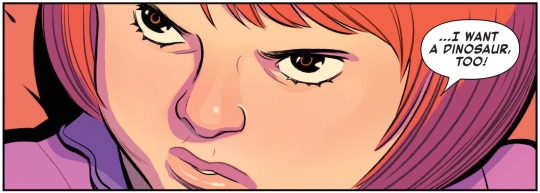
That’s a tough request, yet the Kingpin is used to getting his way and if his daughter wants a dinosaur then a dinosaur she shall have.
The next day, Lunella has discovered that Devin has once more gone missing. She dons her Moon Girl outfit and uses her specialized tracking device to seek him out. Unfortunately, her device is meant to track down big red dinosaurs and doesn’t work as well for redheaded nine-year-old boys…
Suddenly she hears Devin’s ersatz roar and chooses the sound into a nearby ally. Here she finds Devin held in the clutches of the nefarious Wrecking Crew, a team of super powered villains who have faced off against the likes of The Hulk and the Mighty Thor. They are big time bad news and it appears abundantly clear they have been hired by The Kingpin to get to Lunella and take from her Devil Dinosaur so that he might be offered up to Princess. Oh boy…

And it is here that the issue comes to its cliffhanger conclusion, with the promise of continuation in the next installment. As to how Moon Girl will be able to go up against The Wrecking Crew without the assistance of Devil D is difficulty to try and figure out. Brains beats brawn most of the time, but this is a whole lot of brawn and may very well prove too much for Moon Girl’s brains. Looking forward to seeing how Lunella navigates through this one!
Yet another fun ride… Not a good deal of action, but it’s made up for by a lotto fun bits and character development for both Lunella and the books extended cast.
some disjointed thoughts:
Younger kids do indeed quite often have a hard time expressing their ‘liking’ a peer; and this does frequently lead to them being mean or bullying in a clumsy effort to gain their crush’s attention. And though Devin does not have a crush on Princess, it’s been clear for a while that Eduardo has a bit of a sneaker for Zoe and I hope the ongoing narrative will explore this further in the future.
Lunella’s mom and dad have really struggled in finding a way to relate to their daughter and Lunella’s reaction to what her grandparents had to say offers up an avenue in which they might finally do so. She seemed to really like the idea that her mom an ddad were like her when they were younger. Her mom and dad need to stop trying to control Lunella and instead try to better empathize with her.
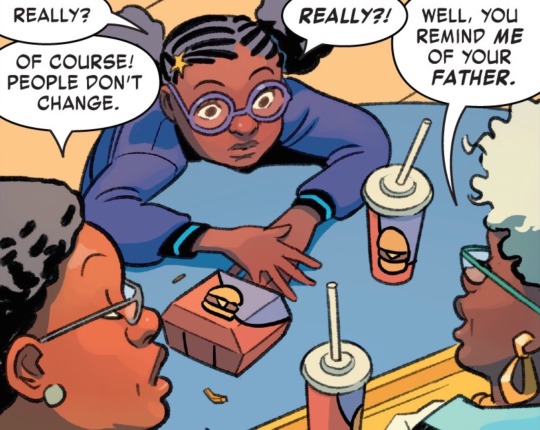
Princess is a total brat, but she is not completely unsympathetic. Her desire for attention and demands to get her way looks to be merely a defense, a stand-in for the parental support and containment she has been denied. Being orphaned is a pretty traumatic affair and her bratty, near-despotic behavior can be seen as an understandable reaction to such a trauma. All the things she demands of her adoptive father is merely smokescreen covering up a painfully insecure attachment. Fisk doesn’t need to get her a dinosaur, he just needs to spend quality time with her and make her feel loved, contained and connected to.

It looks like The Wrecking Crew has recruited a new member to fill in for Thunderball. I wonder what her story is...
Taking a step away from the more light-hearted aspects of the issue, I was a little troubled by a certain aspect to the issue...
So Devin’s wild behavior makes for a fun parallel for kids dealing with attention-deficit/hyperactivity disorder. And yet it’s kind of a tough one if you look at it in greater depth. Some cases of ADHD are connected to a neurological situation referred to as ‘hypofrontality.’ This is when there is lower-than-average levels of blood flow and metabolism in the frontal lobes of the brain. The frontal lobes are sort of the executive branch of cognition… it’s where decisions are made, behavior is planned out, consequences are considered.
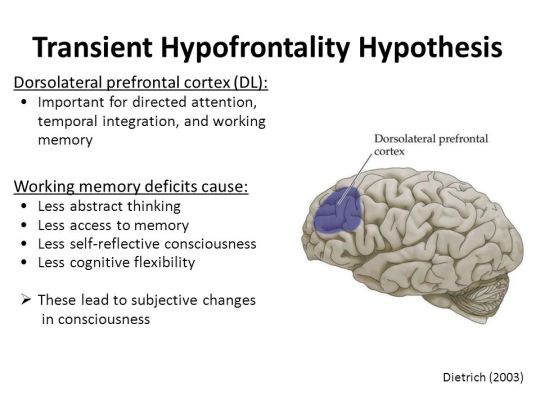
Diminished activity in the frontal lobes can lead to impulsive behavior, difficulties paying attention, troubles resisting distraction. Psychostimulant medications, like Ritilan or Concerta, act to compensate for the reduced activity in the frontal lobes. The stimulant effect acts to speed up blood flow and metabolism throughout the brain, including the frontal lobes.
While medication can be quite helpful for individuals coping with ADHD, I’ve achieved the same effect with many patients by way of cognitive-behavioral strategies and skill-building for executive functioning. Combining psychotherapeutic skill-building with medication can allow for using a lower dose of the medication for a shorter period of time (which is good since there can be substantial side-effects to these medications).
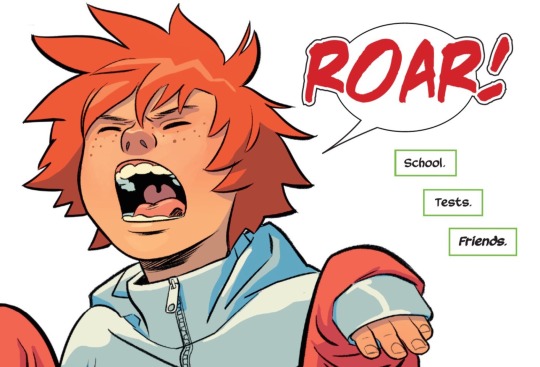
Anyways, while it’s kind of fun to see Devin Dinosaur act like a kid dealing with ADHD, it’s not really a metaphor I want to get fully behind. Tyrannosaurs have notoriously small brains, they’re not the sharpest knives in the paleontologic drawer. Children and adults coping with ADHD and/or hypofrontality are not akin to dim-witted dinosaurs… their brains are not smaller nor less effective - they merely function in a different fashion.
Sometimes, brain activity can be kind of a hydraulic thing… reduced neurological activity in the frontal lobes can quite often co-occur with heightened activities in other regions of the brain. It can correlate to heightened activity in the temporal lobes, the parietal lobes, the limbic lobe. This is why many individuals who struggle with scholastic work due to ADHD can excel in other areas… can be great athletes, awesome at video games, can be super creative and/or highly empathetic and sensitive souls.

Then again, I guess Devil D is not your average dinosaur. He’s not the mindless brute more often associated with a tyrannosaurs rex. He’s intuitive, sensitive, loyal and good guy and very much a hero. I might be overthinking all this. I guess it could be fun for a kid with ADHD to see themselves reflected in Devin Dinosaur; and not feel offended that they are presented as akin to an animal.
I’m rambling…
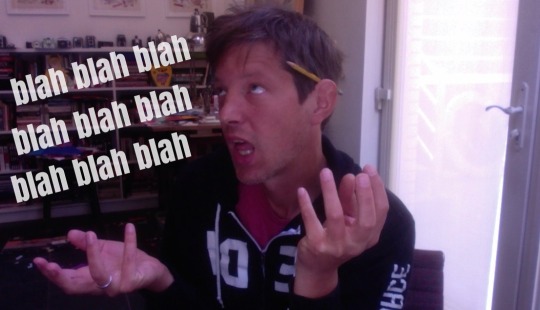
In any case, a fun read… once more excellently illustrated, beautifully colored… another highly recommended installment. Four out of five Lockjaws!

#Moon Girl and Devil Dinosaur#Brandon Montclare#Natacha Bustos#Tamra Bonvillain#review#spoilers#Inhumans#ADHD
20 notes
·
View notes
Text
The Essential Guide to Reducing stress with Meditation and Mindfulness (Chapter 1)

Why you must stress less
We all know that stress is bad for us and this is something we get told very often. However, it’s all too easy to write this off as being a minor nuisance or frustration rather than anything to really worry about. We all get stressed from time to time, right? In reality though, this is the wrong way to think about stress. While it is fairly common place, that is not to say that it isn’t serious. In fact, stress is incredibly serious and can cause severe problems both in the short term and long term.
Stress can shorten your lifespan. Ruin your enjoyment. Cause serious illness. Shrink your brain. Hurt your performance. Ruin your relationships. Cause impotence. Stress Less 4 Do those sound like small matters? To understand this better, it can help to look more closely at what precisely stress is. How it causes the problems it does and how and why you need to do everything you can to prevent and reduce it.
So What Exactly is Stress?
Stress is what we feel when we’re overworked, when we’re dreading something that’s about to happen or when we’re generally unable to relax and stay calm due to outside or inside factors influencing our thoughts. But it actually goes beyond this. Stress is a basic physiological reaction that is designed to help us focus and survive. In itself it is not a bad thing and is actually rather adaptive. The problem is that it has been taken out of context, which means the positive effects become outweighed by the negative. Essentially, stress is what causes the ‘fight or flight response’. This is a physiological response to perceived danger, designed to improve our chances of survival. If you were to see a lion for example, this would trigger a cascade of effects collectively resulting in the stress response. This begins when we observe danger or experience fear. Increased activity in our brain, causes the release of adrenaline, as well as dopamine, norepinephrine and cortisol – our stress hormones. These then trigger a number of physiological changes: increasing our heartrate, making us breathe more quickly and making us more acutely focussed on the potential threat.
A list of the symptoms should include:
• Increased heartrate
• Rapid, shallow breathing
• Muscle contraction
• Tunnel vision
• Heightened sensitivity
• Increased blood viscosity
• Suppression of the pain response
• Suppression of the immune system
• Suppression of the digestive system
• Dilation of the pupils
• Dilation of the blood vessels
• Reduction in prefrontal cortex activity (temporo-hypofrontality)
In the short term, this is good for us. In the short term, these things help us to evade danger and win combative situations. Increased muscle tension makes us stronger. Increased blood viscosity makes our blood more likely to clot in case of an injury. Dilated pupils let more light in to improve our vision. Suppression of secondary functions means that more blood can be sent to the muscles and the brain. Reduced pain means we can carry on fighting or running despite injury.
In short, anything that can help you to survive is prioritized, while secondary functions are suppressed. The idea is that once we get to safety, we can then turn off this fight or flight response and instead enter the ‘rest and digest’ state in order to recover. Once the predator is gone, we can recover. But the problem is that in our modern environments, predators aren’t the main problem. It’s rare these days for us to be chased, to get into a fight or to need to escape a forest fire. What’s not so rare, is for our boss to shout at us and to tell us that we’re late for our deadline. It’s not rare for us to be in debt. It’s not rare for us to have marital problems. And unfortunately, the brain interprets all these signals in just the same way: as threats. And this causes the same fight or flight response. But because these types of threats aren’t so easily resolved, this means we’ll often end up on heightened alert for a longer period of time. This is also why stress causes impotence in men. If you are highly stressed, blood is sent everywhere except the genitals! And this takes a tremendous toll on our bodies. As you might imagine: it is not good for you when your immune system and digestive system are suppressed for days. It’s also not good for your brain to be flooded with norepinephrine and cortisol. It’s not good for your heartrate to stay elevated, or your blood pressure to stay high.
This is the problem with chronic stress as opposed to acute stress. And it’s the problem with heightened levels of stress, as opposed to the gentle, motivating force of ‘eustress’. We’ll look at all of this more in the long term, but suffice to say that the longer stress like this continues, the more you start to feel drained, malnourished, fatigued, ill and possibly eventually depressed. How Stress Damages the Brain When we are stressed, it effectively makes us less intelligent. This is due to the reduction in pre-frontal activity, which in turn is designed to make us more focussed and alert. Essentially, the pre-frontal cortex is the part of the brain responsible for forward planning, creative thinking and other ‘high-order’ brain activity. When you are being chased by a lion though, it is really not the time to be thinking about the meaning of life! So shutting down this part of the brain and placing your focus on feedback from your senses makes much more sense. Of course that’s not particularly useful in the workplace though: and this is why the stress response is so seriously unhelpful when we have to give a presentation, answer a question on the spot or go on a date. This is when we lose all articulation and start stammering and saying useless things. Slightly longer-term is adrenal fatigue. This is what happens when your brain has exhausted its supply of adrenaline and other stress hormones. That might sound like a good thing but you actually need a little norepinephrine, dopamine and cortisol to stay motivated – and even to wake up in the morning! Adrenal fatigue leaves you listless, demotivated and potentially depressed. It can also cause what is known as ‘learned helplessness’ – a condition where you essentially completely give up because your brain has been conditioned to learn that any attempts to change its situation will be met with failure. Not good! Worse, when you are highly stressed, it can lead to long term problems for your brain health. As we briefly mentioned: it can literally shrink your brain! Studies show that in the long term, it leads to structural changes that shrink the hippocampus and shrink grey matter – the all-important neural connections throughout the brain. Even a single, severe traumatic event can result in significant reductions in the medial PFC, anterior cingulate and subequal regions of the brain. The effects of ‘cumulative adversity’ meanwhile, cause smaller volumes in the medial prefrontal cortex (the PFC), insular cortex and anterior cingulate regions. These regions of the brain correspond with emotional control, decision-making, reasoning and self control. In other words, the eventual result of stress is to leave you more reactionary, more depressive, more impulsive and less disciplined. From here, every aspect of your life will start to see negative effects. But there are things you can do about it…
0 notes
Photo

Cognitive ecstasy - Flow Experience (on Wattpad) https://www.wattpad.com/1041808683-cognitive-ecstasy-flow-experience?utm_source=web&utm_medium=tumblr&utm_content=share_reading&wp_uname=tberci&wp_originator=iuVni9YnBaIgKz19ltFvDaY6rLPe0yYzFU15tiNvboJqOZJ7Wl%2Bv7r%2Fh%2FIeIqLdvL9rl8sH7ppbvKPOAdJTQe4zMCnWoKfrbx5ugsAlxp%2BYObmOJKN%2FSXSlxBKTfZit8 "The flow-experience while running is likely due to the exercise-induced transient hypofrontality. At these times, we forget ourselves, the passing of time, our self-criticism, even our sense of pain decreases. This is why it is possible to run faster on a long-distance than we ever thought we could when in a state of flow. "
#cancer#feeltoheal#flow#heal#health#inspire#mindset#motivationalbook#positive#run#runningbook#sport#non-fiction#books#wattpad#amreading
0 notes